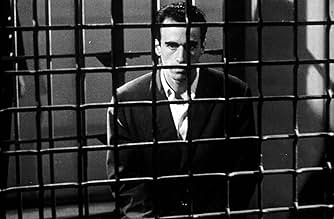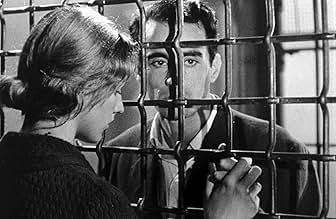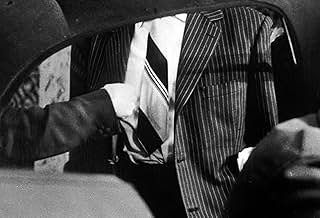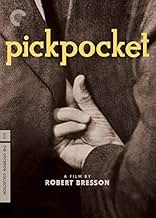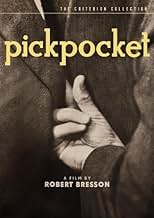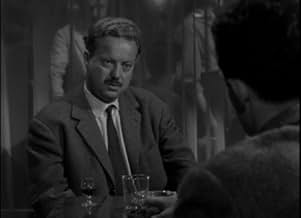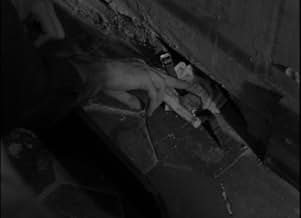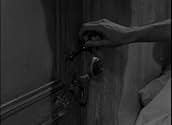CALIFICACIÓN DE IMDb
7.6/10
27 k
TU CALIFICACIÓN
Michel sale de la cárcel tras cumplir una sentencia por robo. Su madre muere, y vuelve a las andadas para sobrevivir.Michel sale de la cárcel tras cumplir una sentencia por robo. Su madre muere, y vuelve a las andadas para sobrevivir.Michel sale de la cárcel tras cumplir una sentencia por robo. Su madre muere, y vuelve a las andadas para sobrevivir.
- Dirección
- Guionista
- Elenco
- Premios
- 3 nominaciones en total
- Dirección
- Guionista
- Todo el elenco y el equipo
- Producción, taquilla y más en IMDbPro
Opiniones destacadas
In his dismissal determination to keep out elements often thought fundamental to the mediumspectacle, drama, performance Bresson has followed an incomparable personal vision of the world that stays consistent whatever the nature of his subject matter...
In "Pickpocket," a petty thief understands life's mystery only when his conventional wisdom is violently shaken and embraces humanity through his newfound love Most notable, however, is not the emphasis upon redemption attained through communication and self-sacrifice, but the high-purity of Bresson's style...
The camera keeps out pictorial beauty to create an abstract timeless world through the detached, detailed observation of hands, faces, and objects; natural sounds rather than music to satisfy the need In thus rejecting conventional realism and characterization, Bresson manifested a fascination not with human psychology but with the capacity of the soul to survive in a world of pain, disbelieve, and restriction...
In "Pickpocket," a petty thief understands life's mystery only when his conventional wisdom is violently shaken and embraces humanity through his newfound love Most notable, however, is not the emphasis upon redemption attained through communication and self-sacrifice, but the high-purity of Bresson's style...
The camera keeps out pictorial beauty to create an abstract timeless world through the detached, detailed observation of hands, faces, and objects; natural sounds rather than music to satisfy the need In thus rejecting conventional realism and characterization, Bresson manifested a fascination not with human psychology but with the capacity of the soul to survive in a world of pain, disbelieve, and restriction...
A remarkable film even though the ending is anti-climactic. An amateur pickpocket gets lucky and meets Kassagi, the real-life pickpocket who served as the film's technical consultant. The most amazing scene is the one where three pickpockets rob one passenger after another on a train, taking wallets, passing them off to each other, then emptying and dumping them (or in one case, neatly replacing the lightened wallet in a man's pocket!). The light-finger techniques seem more or less authentic, although I imagine the director's script might have called for inauthentic bits of business. (No, I am not a pickpocket; I was a mark once, and they really messed up my life for a couple of days, but I have been fascinated ever since.)
The pickpockets in this movie follow the European style of stealing men's wallets practically face-to-face. (American pickpockets traditionally prefer to steal from behind to avoid any chance of a mark seeing their faces. When I was taken, I never saw, heard or felt anything.)
LaSalle as Michel is deadpan, but that seems to be part of his character. Now and again, he bubbles a little with suppressed feeling, mostly anger. His passion for Jeanne (Marika Green) is so completely submerged that it does not come out until the end. (If you think I'm spoiling anything, you will want to skip the on screen legend that opens the film because it gives away even more.) As a love story, this does not work. I get it, though: Something happened before the film begins that makes Michel extremely ashamed. He can't be with his mother or anyone he cares about because of his guilt.
The pickpockets in this movie follow the European style of stealing men's wallets practically face-to-face. (American pickpockets traditionally prefer to steal from behind to avoid any chance of a mark seeing their faces. When I was taken, I never saw, heard or felt anything.)
LaSalle as Michel is deadpan, but that seems to be part of his character. Now and again, he bubbles a little with suppressed feeling, mostly anger. His passion for Jeanne (Marika Green) is so completely submerged that it does not come out until the end. (If you think I'm spoiling anything, you will want to skip the on screen legend that opens the film because it gives away even more.) As a love story, this does not work. I get it, though: Something happened before the film begins that makes Michel extremely ashamed. He can't be with his mother or anyone he cares about because of his guilt.
Robert Bresson's Pickpocket has many great moments, even as it didn't quite do it for me on a first viewing as a 'masterpiece'(some have said to see it twice, perhaps I will). Bresson's use of the camera is often intoxicating in the most subdued, subtle, in-direct distinctions; at times it does take on the prowess of literature. But my only minor nitpick with the film is that it leaves a sort of cold viewing on a viewer, with such simplicity and emotions stripped from the character(s) that it's hard to connect. And yet, this is really made up tenfold with the sort of style that can be likely called Bressonian; straightforward angles, tense medium close-ups, serene editing, and little to no music.
Whatever it sets up for this actor to do, it sets up well. Indeed, the actor who plays the protagonist here is actually very good, aside from the disconnection, and provides an excellent way for us to get along his side. He is a decent person, but there are certain things that get to him, which is why he feels he must steal. At times I almost had a grin as he made some successful grabs, by himself or his cohorts. Was I rooting for him, or just pleased by the pay-off of Bresson's suspense? Maybe both; there is definitely one truly virtuoso sequence in the film, when the pickpockets go on the train.
Like A Man Escaped, there is that sort of dissection, quietly and without really digging too deep, into what a man wants with his life, or doesn't want. While the hero has only one determination in Man Escaped, to get out, Pickpocket has a man who doesn't know what to do with himself, only coming to a genuine catharsis behind bars. I think I like Pickpocket a little more, but I may like it even more on another viewing.
Whatever it sets up for this actor to do, it sets up well. Indeed, the actor who plays the protagonist here is actually very good, aside from the disconnection, and provides an excellent way for us to get along his side. He is a decent person, but there are certain things that get to him, which is why he feels he must steal. At times I almost had a grin as he made some successful grabs, by himself or his cohorts. Was I rooting for him, or just pleased by the pay-off of Bresson's suspense? Maybe both; there is definitely one truly virtuoso sequence in the film, when the pickpockets go on the train.
Like A Man Escaped, there is that sort of dissection, quietly and without really digging too deep, into what a man wants with his life, or doesn't want. While the hero has only one determination in Man Escaped, to get out, Pickpocket has a man who doesn't know what to do with himself, only coming to a genuine catharsis behind bars. I think I like Pickpocket a little more, but I may like it even more on another viewing.
This slow burn film from Robert Bresson is not going to be to everyone's taste, and I'm not sure it was to mine. It's a film I admired more than enjoyed.
It tells the story of a man who's addicted to theft, or maybe more accurately addicted to the rush of getting away with theft, or maybe more accurately addicted to the rush of possibly being caught thieving. It's not a long movie but it may try your patience, as it's very slow and very quiet. The main character is a bit of a blank slate, and he remains so. We never learn much about him, and I personally didn't feel especially invested in what happened to him. It was only in reading about the film after seeing it that I found out the ending is considered to be remarkable among film scholars, but I didn't react to it much myself.
The best scenes in the movie are those that show the elaborate rituals that exist among pickpocket teams, and the pretty amazing feats they pull off. They're like magicians who use sleight of hand for nefarious purposes.
Grade: B+
It tells the story of a man who's addicted to theft, or maybe more accurately addicted to the rush of getting away with theft, or maybe more accurately addicted to the rush of possibly being caught thieving. It's not a long movie but it may try your patience, as it's very slow and very quiet. The main character is a bit of a blank slate, and he remains so. We never learn much about him, and I personally didn't feel especially invested in what happened to him. It was only in reading about the film after seeing it that I found out the ending is considered to be remarkable among film scholars, but I didn't react to it much myself.
The best scenes in the movie are those that show the elaborate rituals that exist among pickpocket teams, and the pretty amazing feats they pull off. They're like magicians who use sleight of hand for nefarious purposes.
Grade: B+
Probably the most influential of Robert Bresson's trio of masterpieces from the Fifties (the other two being *A Man Escaped* and, of course, *Diary of a Country Priest*). *Pickpocket* sowed its seeds of influence in the minds of any number of film artists -- Jean-Pierre Melville most notably (who despised Bresson, apparently), whose *Le Samourai* was a mighty struggle against this film . . . and, most completely, writer-director Paul Schrader, who, you'll recall, wrote the *Taxi Driver* screenplay, which was another story about a loner on the outside of societal norms. And it goes without saying that Schrader's *American Gigolo*, which he also directed, is a virtual rewrite of *Pickpocket*, right down to the egregiously plagiarized finale.
The subject of Bresson's film is not nearly as sexy a conception as Schrader's gigolo, though the milieu is equally as sleazy. Instead of preening Richard Gere, we get acting novice Martin LaSalle as the Pickpocket, who wears one suit through the entire film. (Schrader obviously thought he was being clever by giving Gere a large closet stuffed with designer suits). LaSalle lives in a crumbly walk-up flat in Paris, where his books gather dust and the baseboards hide his humble stash of francs and the occasional wristwatch. He has few friends and is too ashamed to visit his dying mother (I won't spoil the reason why). The only pleasure he derives is from his compulsive work as a pickpocket, and it is in these scenes that Bresson stuns us with his martinet control of both narrative pacing and camera placement. The director lovingly shows us the subtle skills of the street thief: the creeping hands, the split-second scams (such as lifting a wallet from a man's suit breast-pocket while standing next to him and pretending to read a newspaper), the choreographed celerity of movement when the thief works with his partners in crime. There's one sequence that follows LaSalle and his two accomplices from a train station all the way to the train, in which they lift about 15 wallets and the occasional purse. The camera-work and editing here is nothing less than sheer mastery -- a ballet of thievery. And let it also be said that Bresson is no slouch when it comes to suspense. It's an intimate and sweaty suspense: will LaSalle's fingers, as they slowly reach into a purse, be noticed?
As might be expected from a French director of the period, there's also plenty of philosophizing to be found here, and in this case, the philosophy is actually pretty interesting. The movie takes as its intellectual parents the ubermensch riff by Nietzsche and Dostoyevsky's "Crime and Punishment". LaSalle asks the cop who's on his trail if society's "supermen", even if they choose to be thieves, should not only be let alone, but even respected as an overall benefit to society. (Thus sprach Kenneth Lay!) Obviously, we can mull that over ourselves, but in the meantime, Bresson is not particularly impressed with the "decent" elements of society. The cop is a pompous blow-hard who can offer LaSalle no alternative to his criminality. Bresson is more or less saying that modern society is contemptible: your acceptance of that thesis, and the importance you place on the occasional 100 francs getting lifted from an overfed bourgeois, will ultimately determine your acceptance of this film.
But perhaps its style will bog you down. As per usual, Bresson breaks virtually every rule of the movies. The use of non-actors in the main roles engenders both assets and liabilities: while the avoidance of the typical actors' nonsense is a definite asset, the liabilities occur when Bresson asks his "interpreters" to finally, well, act. There are a few scenes here where the incompetence of LaSalle (he eventually became a fine actor, but he was virtually plucked off the street by Bresson in 1958) will make you cringe, especially when LaSalle is supposed to be angry with someone. There IS something to be said for professionals -- even professional actors. And if none of this puts you off, perhaps Bresson's perverse narrative style -- including scenes in which a character writes down on a piece of paper the following narrative action, to be followed by the character READING what he has just written down, and climaxed by the character DOING just what he wrote and said he was going to do -- will make you scratch your head and mutter something about the arty pretensions of French directors.
And your comments would certainly be justified in Bresson's later productions. But in *Pickpocket*, I feel, the narrative precision, lack of bloat (the movie is 75 minutes long), and broader philosophical questions coalesce into a stringent masterpiece that must finally win your respect. Besides: you gotta love a movie about a pickpocket who never bothers to lock, or even close, his own front door. See? Bresson can even be funny.
8 stars out of 10.
The subject of Bresson's film is not nearly as sexy a conception as Schrader's gigolo, though the milieu is equally as sleazy. Instead of preening Richard Gere, we get acting novice Martin LaSalle as the Pickpocket, who wears one suit through the entire film. (Schrader obviously thought he was being clever by giving Gere a large closet stuffed with designer suits). LaSalle lives in a crumbly walk-up flat in Paris, where his books gather dust and the baseboards hide his humble stash of francs and the occasional wristwatch. He has few friends and is too ashamed to visit his dying mother (I won't spoil the reason why). The only pleasure he derives is from his compulsive work as a pickpocket, and it is in these scenes that Bresson stuns us with his martinet control of both narrative pacing and camera placement. The director lovingly shows us the subtle skills of the street thief: the creeping hands, the split-second scams (such as lifting a wallet from a man's suit breast-pocket while standing next to him and pretending to read a newspaper), the choreographed celerity of movement when the thief works with his partners in crime. There's one sequence that follows LaSalle and his two accomplices from a train station all the way to the train, in which they lift about 15 wallets and the occasional purse. The camera-work and editing here is nothing less than sheer mastery -- a ballet of thievery. And let it also be said that Bresson is no slouch when it comes to suspense. It's an intimate and sweaty suspense: will LaSalle's fingers, as they slowly reach into a purse, be noticed?
As might be expected from a French director of the period, there's also plenty of philosophizing to be found here, and in this case, the philosophy is actually pretty interesting. The movie takes as its intellectual parents the ubermensch riff by Nietzsche and Dostoyevsky's "Crime and Punishment". LaSalle asks the cop who's on his trail if society's "supermen", even if they choose to be thieves, should not only be let alone, but even respected as an overall benefit to society. (Thus sprach Kenneth Lay!) Obviously, we can mull that over ourselves, but in the meantime, Bresson is not particularly impressed with the "decent" elements of society. The cop is a pompous blow-hard who can offer LaSalle no alternative to his criminality. Bresson is more or less saying that modern society is contemptible: your acceptance of that thesis, and the importance you place on the occasional 100 francs getting lifted from an overfed bourgeois, will ultimately determine your acceptance of this film.
But perhaps its style will bog you down. As per usual, Bresson breaks virtually every rule of the movies. The use of non-actors in the main roles engenders both assets and liabilities: while the avoidance of the typical actors' nonsense is a definite asset, the liabilities occur when Bresson asks his "interpreters" to finally, well, act. There are a few scenes here where the incompetence of LaSalle (he eventually became a fine actor, but he was virtually plucked off the street by Bresson in 1958) will make you cringe, especially when LaSalle is supposed to be angry with someone. There IS something to be said for professionals -- even professional actors. And if none of this puts you off, perhaps Bresson's perverse narrative style -- including scenes in which a character writes down on a piece of paper the following narrative action, to be followed by the character READING what he has just written down, and climaxed by the character DOING just what he wrote and said he was going to do -- will make you scratch your head and mutter something about the arty pretensions of French directors.
And your comments would certainly be justified in Bresson's later productions. But in *Pickpocket*, I feel, the narrative precision, lack of bloat (the movie is 75 minutes long), and broader philosophical questions coalesce into a stringent masterpiece that must finally win your respect. Besides: you gotta love a movie about a pickpocket who never bothers to lock, or even close, his own front door. See? Bresson can even be funny.
8 stars out of 10.
¿Sabías que…?
- TriviaBanned in Finland until 1965 because of its depiction of authentic pickpocketing techniques.
- ConexionesEdited into Histoire(s) du cinéma: Une histoire seule (1989)
- Bandas sonorasSuite de symphonies d'Amadis (selection)
(uncredited)
Music by Jean-Baptiste Lully (as J.B. Lulli)
Éditions Transatlantiques
Selecciones populares
Inicia sesión para calificar y agrega a la lista de videos para obtener recomendaciones personalizadas
- How long is Pickpocket?Con tecnología de Alexa
Detalles
Taquilla
- Total a nivel mundial
- USD 7,541
- Tiempo de ejecución1 hora 16 minutos
- Color
- Relación de aspecto
- 1.37 : 1
Contribuir a esta página
Sugiere una edición o agrega el contenido que falta

Principales brechas de datos
By what name was Pickpocket (1959) officially released in India in English?
Responda

